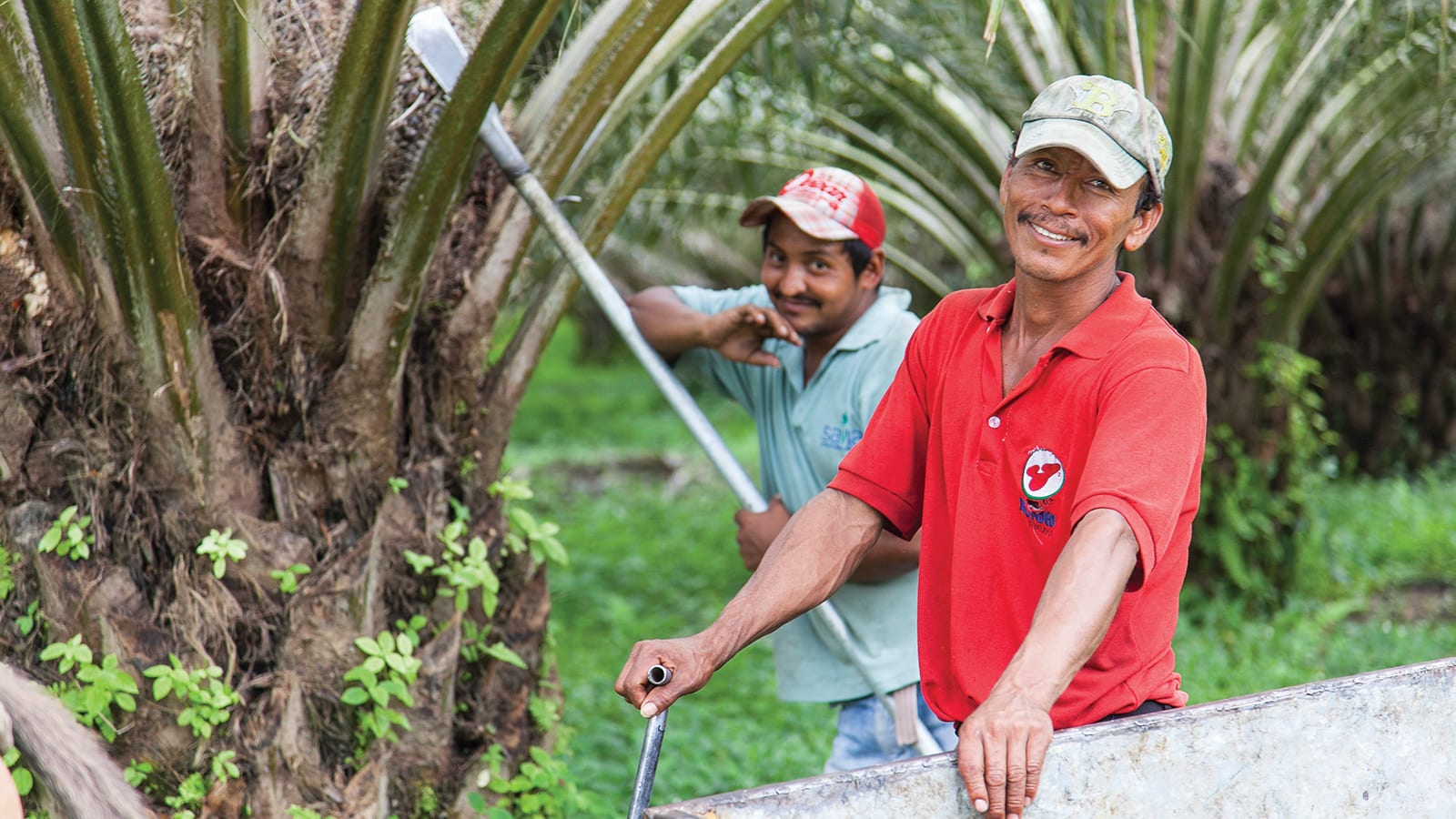In our stores: highlighting Palm Done Right
This article was originally published in September 2018

Palm oil can be grown sustainably and ethically. This month we showcase the mission-based movement, Palm Done Right — bringing together manufacturers, retailers and consumers to change how palm oil is produced.
September is Palm Done Right month and we’re excited to highlight the Palm Done Right initiative and some producers who are using Palm Done Right in their products.
Palm is a tropical oil that comes from the fruit of the African oil palm, Elaesis Guineensis, one of two main fruit-bearing tropical palm species. Palm oil is a saturated fat that can be used in a multitude of ways. It adds stability, emulsification, and a smooth mouthfeel and texture to products, without trans fats.
Palm oil today is in roughly 50 percent of U.S. consumer products. Found not only in foods from crackers and ketchup, palm oil is also in soaps and body lotions, cosmetics, household cleaners, dish detergents and even animal feed. Demand for palm oil has soared since the Food and Drug Administration required food labels to list trans fats content (usually from hydrogenated fats) in 2006. Palm oil is a perfect substitute for hydrogenated fats because it’s shelf stable at room temperature and isn’t inherently unhealthy.
Unfortunately, palm oil’s promotion has prompted massive clear-cutting of tropical forests, especially in Indonesia and Malaysia, to plant palm plantations. According to the World Wildlife Fund, the equivalent of 300 football fields is cleared every hour to make way for palm plantations — releasing greenhouse gases, driving already-threatened animal species toward extinction, and forcing out or burning out indigenous communities. Draining the peat swamps and processing palm also produces methane gas, and the palm oil industry is among the most notorious for forced and child labor.
To address these issues, the Natural Habitats Group created Palm Done Right, an educational platform determined to produce a better palm oil with more ethical production. In fact, done right, palm oil could be one of the most sustainable oils on the planet. Palm Done Right presents the first fully integrated, 100 percent organic supply chain in the palm oil industry.
Palm Done Right requires fair labor certification, organic certification, Non-GMO Project Verification, and has the highest level of certification — Identity Preserved — offered by the Roundtable for Sustainable Palm Oil (RSPO). It prohibits clear-cutting, burning forests, planting in virgin or second-growth rain forests, and human trafficking and slavery. This combination of ethical and ecological production practices helps to preserve the environment, native species and native communities.
Palm Done Right palm oil from small farms in Ecuador and Sierra Leone goes “beyond organic” by encouraging multi-cropping, organic matter and soil inputs to enhance carbon sequestration and biological diversity. It combines experience and wisdom from indigenous cultures with the technical know-how of professional agronomists to empower farmers with the knowledge, support and resources they need to grow organically.
Palm Done Right integrity is controlled through its 100 percent vertically-integrated supply chain, from farm to consumer. Palm Done Right partners with farmers, agronomists, retailers, and manufacturers, working with companies who are committed to a fair, equitable and organic supply chain.
Learn more about the positive benefits of sustainably sourced palm oil at www.palmdoneright.com.
[ Store Picks – Highlighting products using Palm Done Right oil ]
- We’re excited to partner with Moon Valley Organics for our new private label PCC soaps! Moon Valley Organics provides high quality, organic personal care products that are healthy for our bodies and the planet. The ingredients in Moon Valley products are sustainably grown in their certified organic farm using permaculture practices. Herbs are carefully dried, processed and packaged on site in environmentally friendly containers. All products that can’t be grown locally are fair trade and Rainforest Action Network certified. Moon Valley Organics is proud to use Palm Done Right oil in all their bar soaps — including ours.
- Nutiva’s Organic Unrefined Red Palm Oil is sustainable, organic, non-GMO and habitat safe. Red palm oil is the highest in vitamin A and E of any plant-based oil and also is delicious! Nutiva’s high-quality filtration process creates a culinary oil ideal for soups, sauces and sautés.
For recipes and tips on how to cook with palm oil, visit: kitchen.nutiva.com/20-ways-to-use-organic-unrefined-red-palm-oil/. - Oregon Soap Company is dedicated to leaving the earth cleaner than they found it. The soaps are mild and long-lasting with a wide range of scents. Not only do these soaps use Palm Done Right oil, but they are made with reusable energy, too!
- Dr. Bronner’s Pure Castile Soaps can be used for any cleaning task — from face, hair and body to dishes, laundry, mopping and pet baths. Dr. Bronner’s is a family business committed to making socially and environmentally responsible products of the highest quality with independent third-party certifications, ensuring high standards for ecological and social sustainability.
- Wholly Wholesome frozen pie crusts take out the hardest part of making a pie without compromising that homemade taste. Certified organic and “naturally wholishious!”
- Jovial Organic Einkorn cookies are made from the world’s most ancient wheat, einkorn, the only wheat that has never been hybridized. Einkorn has 30 percent more protein and 30 percent less starch than regular wheat and is a healthy alternative for those with gluten sensitivity. Baked in small batches by artisan bakers, these Italian-style cookies have just the right amount of sweet.
- PCC baked goods and vegan frosting are also made with Aunt Patty’s Palm Done Right shortening.
[ In Season ]
Organic Produce
- Honeycrisp and Gala apples — River Valley Organics in Tonasket, Washington
- Bosc and Seckel pears — River Valley Organics in Tonasket, Washington
- Bartlett pears — Scott Leach Orchards in Zillah, Washington
- Flavor Grenade pluots — First Fruits/Broetje and Congdon Orchards, Yakima, Washington
- Keitt mangoes — Corona College Heights in Coachella, California
